湘教版-英语-九上-Topic 1 .(重点单词词组句子归纳)
湘教版-英语-九上-Topic1.
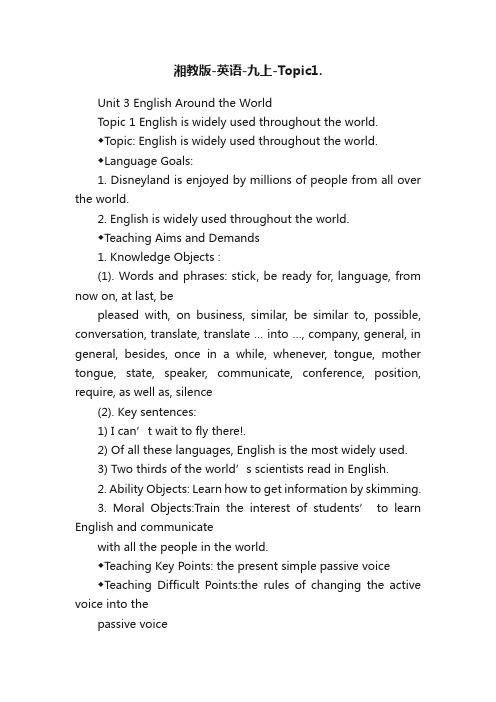
湘教版-英语-九上-Topic1.Unit 3 English Around the WorldTopic 1 English is widely used throughout the world.◆Topic: English is widely used throughout the world.◆Language Goals:1. Disneyland is enjoyed by millions of people from all over the world.2. English is widely used throughout the world.◆Teaching Aims and Demands1. Knowledge Objects :(1). Words and phrases: stick, be ready for, language, from now on, at last, bepleased with, on business, similar, be similar to, possible, conversation, translate, translate … into …, company, general, in general, besides, once in a while, whenever, tongue, mother tongue, state, speaker, communicate, conference, position, require, as well as, silence(2). Key sentences:1) I can’t wait to fly there!.2) Of all these languages, English is the most widely used.3) Two thirds of the world’s scientists read in English.2. Ability Objects: Learn how to get information by skimming.3. Moral Objects:Train the interest of students’ to learn English and communicatewith all the people in the world.◆Teaching Key Points: the present simple passive voice◆Teaching Difficult Points:the rules of changing the active voice into thepassive voice◆Functions:Talking about English around the world◆Teaching Methods:1. Individual, pair or group method to make every student take an active part in theactivities in class.2. Using discussion method to make every student to express himself in English.3. Skimming the text to get a general idea of the text.4. Scanning the text to get specific information◆Teaching Tools: computers, pictures, tape-recorder◆Teaching Design: 4-5 teaching periods◆Vocabulary:stick, language, similar, possible, conversation, translate,company, general, besides, whenever, tongue, state, speaker, communicate, conference, position, require, silence◆Teaching ProceduresSection AKey points:1. Learn the new words and phrases:stick, be ready for, language, from now on, at last, be pleased with2. Learn and master the simple present passive voice.Pre-task (Homework for preview):Get some information about Mickey Mouse, Donald Duck and Disneyland. Teaching Steps:StepⅠ Review1. Review countries, nations and languages.2. According to the table, introduce the new words and phrase: language, throughout, from now on.We speak Chinese.Chinese is spoken by us.Let students observe the difference of the two sentences and encourage them to talk about others in the form using the passive voice.4. Lead to the new lesson.StepⅡ Presentation5. Show pictures of Mickey Mouse and Donald Duck. Talk about them and lead to the new words and phrase: cartoon, character, stick, be ready for.6. Listen to the tape to do 2 and check the answers.7. Talk about Disneyland and lead to 1a.8. Listen to 1a and ask some questions about it.9. Read 1a carefully, then find out important and difficult points. Encourage students to solve problems by themselves, then give the additional explanation.Step Ⅲ Consolidation10. Work 1b alone and check the answers.11. Read 1a in groups and try to act it out in roles. Encourage the group which does well.Step Ⅳ Practice12. Practice the passive voice. Make sentences after the example in 3a.13. Discuss in groups to find out the rules of changing the active voice into the passive voice.14. Write down some sentences and ask students to change them into the passive voice.15. Encourage students to make sentences with the simple present passive voice. StepⅤ Project16. Work in groups. Show some verbs and ask students to review the past participleof the verbs. Then have a competition after a discussion. The group which makes17. Work in groups. Make sentences with the simple present passive voice to describetheir daily life. Then give a report to the class.Homework:1.We’ve learned so much about English spoken around the world. Is it necessary for us to have a good knowledge of English? Do you think English learning should be paid more attention to than Chinese learning? Please write a composition about it.2.Search for the information about the mother tongue in different countries. FindSection BKey points:1.Go on learning the use of the simple present passive voice.2.Learn knowledge about language and culture.Pre-task (Homework for preview):Search for the information about the national flag, the language, famous buildings of other countries ( at least 10 countries ).Teaching Steps:Step Ⅰ Review1.Ask some students to say some sentences in the simple present passive voice.Encourage them to make more examples.2.Show some sentences. Ask students to change thesentences into the simplepresent passive voice.3.Review the method of changing the active voice to the passive voice.4.Make sentences according to the information given in 3. Finish 3 and check theanswers.5.Lead to the new words and phrases.Step Ⅱ Presentation6.Play a game. The teacher gives the explanations while students say the new words.The student who answers first and correctly is the winner.7.Check answers, finish 1b.8.Show some questions about 1a. Listen to 1a and then answer the questions.9.Read 1a. Find out important and difficult points. Encourage students to solveproblems by themselves, then give the additional explanation.Step Ⅲ Consolidation10.Read 1a in pairs. Act it out in roles.11.Show some key words of 1a. Encourage students to try to retell 1a.Step Ⅳ Practice12.Read 2a quickly. Get the main information by skimming.13.Explain some new words and difficult points to help students understand 2a.Step Ⅴ Project14.Finish 2b. Circle the countries where English is spoken as the first language. Thenthe other countries should be written down, using the passive voice. Discuss the importance of English.15.Work in groups. Fill out the form. ( Draw pictures of the flags.) The group whichfinishes it best is the winner.Homework:1.How many languages are there in the world? Which language is the most widelyused? In how many countries do people speak English as the first language?Search for the information and write some sentences with the simple present passive voice.2.Find out on the Internet or from other resources the countries where English isspoken as the first language.Section CKey points:1.Go on learning the use of the simple present passive voice.2.Learn how to get information by skimming.3.Let students know the wide use of English in the world and encourage them tolearn English well.Pre-task (Homework for preview):Find out information about when and where people use English.Teaching Steps:Step Ⅰ Review1.Ask students to report their task last lesson: Find out how many countries in theworld where English is spoken as the first language.2.Sum up: About 70 countries use English as their first language. It’s lear n ed as thesecond language in over 100 countries.Step Ⅱ Presentation3.Talk about the importance of English. Let students know English is widely used inour daily life and encourage them to learn English harder.4.Learn and master the new words and phrases.5.Listen to 1a. Ask some questions about it.Step Ⅲ Consolidation6.Read 1a carefully, underline the topic sentences of each paragraph and then findsome examples in the passage to prove the topic sentence.7.Read 1a again and do 1b. Check the answers.S tep Ⅳ Practice8.Listen to 2 and finish it. Check the answers.Step Ⅴ Project9. Work in groups. Talk about the pictures in 3. Then discuss when and where10. Work in groups. Collect the English signs around us. Choose one of them to makea sign. Show the sign and explain it to the class. The group whose card is drawn bestis the winner.Homework:1.With the development of Great Britain and the U.S.A., English has become aninternational language. Read articles about the history ofGreat Britain and the U.S.A.2.Have you seen any English signs in the school? Make some English signs and putthem in the right places in the school.Section DKey points:1.Review and sum up the simple present passive voice.2.Get to know the history of English becoming the international language.Pre-task (Homework for preview):Find out how English has become the most popular language in the world. Teaching Steps:Step Ⅰ Review1.Review what we learned last lesson by asking and answering.2.Choose 1 or 2 students to retell 1a in Section C.3.Talk about the history of Great Britain and the U. S. A. Lead to the new section. Step Ⅱ Presentation4.Listen to 1a. Ask some questions about 1a.5.Read 1a carefully. Find out the new words and phrases. Try to understand them inthe passage.6.Give the additional explanation.Step Ⅲ Consolidation7.Read 1a again, find out the key sentences and learn about the history of English.8.Work in groups. Discuss how English has become the most popular language inthe world. Talk about the main stages in the development of English.9.Each group should give a report.10.Finish 1b, then check the answers.Step Ⅳ Practice11.Review the simple present passive voice. Read 2a.12.Read 2b together. Sum up more target expressions and sentences in the top ic. Step Ⅴ Project13.Which language will be most widely used in the future, Chinese or English? Why?English. Hold a debate competition.Homework:English is used all over the world. But do you think English is important in our daily life? As a student, is English useful to you? What do you learn English for? Write a short passage about the importance of English.教学反思:本话题的中心内容是谈论英语学习的重要性以及英语的广泛应用,以谈论迪斯尼乐园为切入点,进而过渡到英语语言的应用,围绕英语的应用展开话题。
九年级英语Unit 1 Topic 1 Our country has developed rapidly. 湘教版
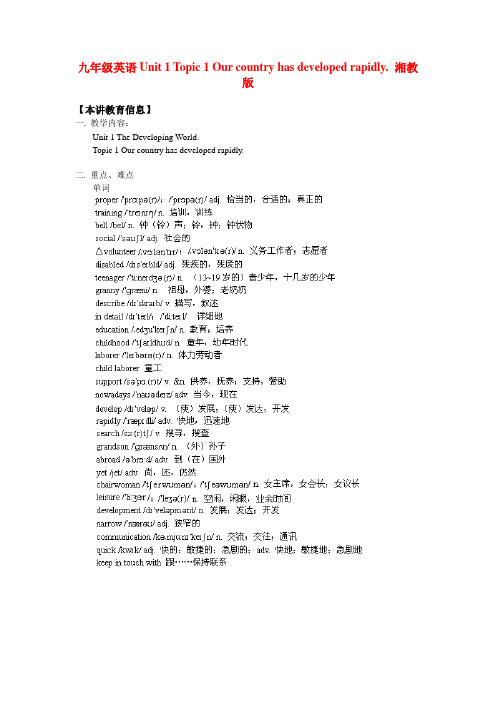
九年级英语Unit 1 Topic 1 Our country has developed rapidly. 湘教版【本讲教育信息】一. 教学内容:Unit 1 The Developing World.Topic 1 Our country has developed rapidly.二. 重点、难点单词短语:feel sorry for the whole holiday learn… from …have a hard life in the past in detailgive support to…search…for…with the development ofkeep in touch with sorts of make progressdream about make preparations for slogan formascots for draw up thanks to句子讲解:Section A1. Rita, you have just come back from your hometown.丽塔,你刚刚从你的家乡返回。
此句为现在完成时态。
现在完成时由“助动词have/ has+ 动词的过去分词”构成,表示过去发生或已经完成的某一动作对现在造成的影响或结果,可与just,already,ever,never,yet等表示时间的副词连用。
如:She has just told me the news. 她刚刚告诉我那个消息。
I have already finished my homework. 我已经做完作业了。
Have you ever spoken to a foreigner? 你曾和外国人交谈过吗?My father hasn’t come back yet. 我爸爸还没有回来。
2. In one place I saw children working for a cruel boss. 在一个地方我看到孩子们正为一个残忍的老板干活。
湘教版-英语-九上-Topic 1 .(重点词组及句型)
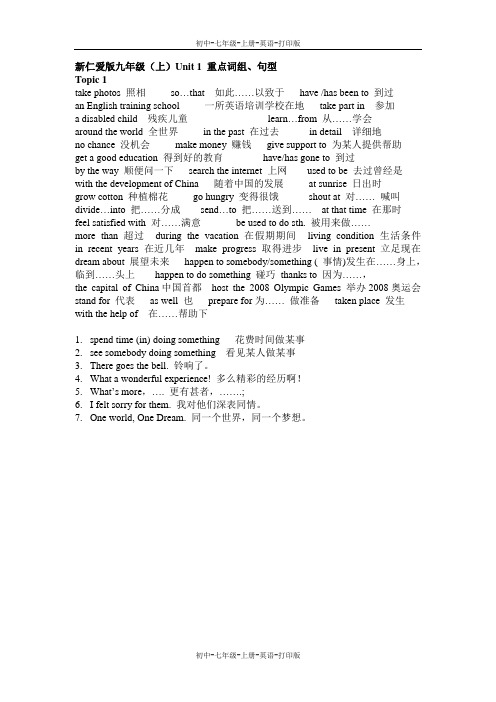
初中-七年级-上册-英语-打印版新仁爱版九年级(上)Unit 1 重点词组、句型Topic 1take photos 照相so…that 如此……以致于have /has been to 到过an English training school 一所英语培训学校在地take part in 参加a disabled child 残疾儿童learn…from 从……学会around the world 全世界in the past 在过去in detail 详细地no chance 没机会make money 赚钱give support to 为某人提供帮助get a good education 得到好的教育have/has gone to 到过by the way 顺便问一下search the internet 上网used to be 去过曾经是with the development of China 随着中国的发展at sunrise 日出时grow cotton 种植棉花go hungry 变得很饿shout at 对……喊叫divide…into 把……分成send…to 把……送到……at that time 在那时feel satisfied with 对……满意be used to do sth. 被用来做……more than 超过during the vacation 在假期期间living condition 生活条件in recent years 在近几年make progress 取得进步live in present 立足现在dream about 展望未来happen to somebody/something ( 事情)发生在……身上,临到……头上happen to do something 碰巧thanks to 因为……,the capital of China中国首都host the 2008 Olympic Games 举办2008奥运会stand for 代表as well 也prepare for为……做准备taken place 发生with the help of 在……帮助下1.spend time (in) doing something 花费时间做某事2.see somebody doing something 看见某人做某事3.There goes the bell. 铃响了。
湘教版-英语-九上-Topic 1 Pollution causes(教学辅导)

Unit 2 Saving the worldTopic 1 There are many kinds of pollution around us.教学引言本单元由老奶奶对环境的抱怨,引出关于环境污染的问题,并介绍不同种类的污染。
语法内容是继续学习现在完成时,为第二部分的展开提供了前提。
中考要求重难点词汇:produce, breathe, waste, cancer, influence, several, secretary, relation, fisherman, president, dead, disturb, downstairs, print, chemical factory, pour…..into, be harmful to.语法:现在完成时中延续性的动作或状态和由for, since引导的一段时间状语搭配使用。
日常交际用语:-How long have you been like this?-I have been like this since last month.It’s a beautiful place with flowers and grass.All the flowers, grass and fish have gone.It smells terrible.Look, there are several chemical factories pouring waste water into the river.It’s our duty to protect the environment.I have been at this school last year/ for one year.Noise is a kind of pollution and it’s harmful to our ears.要点聚焦----本单元重点扫描课堂小贴1: Oh boy, I can’t stand the environment here.哦孩子,我不能忍受这儿的环境。
湘教版-英语-九上-Topic 1 .(SectionC要点总结)
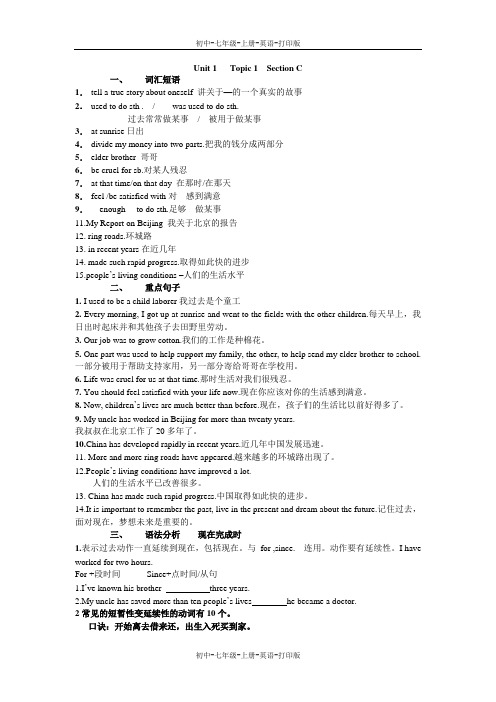
Unit 1 Topic 1 Section C一、词汇短语1.tell a true story about oneself 讲关于—的一个真实的故事2.used to do sth . / was used to do sth.过去常常做某事/ 被用于做某事3.at sunrise日出4.divide my money into two parts.把我的钱分成两部分5.elder brother 哥哥6.be cruel for sb.对某人残忍7.at that time/on that day 在那时/在那天8.feel /be satisfied with对---感到满意9.---enough--- to do sth.足够---做某事11.My Report on Beijing 我关于北京的报告12. ring roads.环城路13. in recent years在近几年14. made such rapid progress.取得如此快的进步15.people’s living conditions –人们的生活水平二、重点句子1. I used to be a child laborer我过去是个童工2. Every morning, I got up at sunrise and went to the fields with the other children.每天早上,我日出时起床并和其他孩子去田野里劳动。
3. Our job was to grow cotton.我们的工作是种棉花。
5. One part was used to help support my family, the other, to help send my elder brother to school. 一部分被用于帮助支持家用,另一部分寄给哥哥在学校用。
6. Life was cruel for us at that time.那时生活对我们很残忍。
新湘九年级上册单词速记

一、二、新湘九年级上册1Unit 1 The Developing World2Topic 1 Our country has developed rapidly.3cruel残忍的,残酷的,无情的adj.(形容词)cru.el.er 或cru.el.ler cru.el.est 或cru.el.lest Cruelhearted adj.狠心的, 铁石心肠的cruelly[♊❑☺☜●✋]adv. Cruelness n. cruelty [ ❑◆☜●♦✋]n.残酷, 冷酷, 刻毒[pl. ]残酷行为, 横蛮行为反义词:kind [kaind]n.种类, 性质adj.仁慈的, 和蔼的, 亲切的, 友爱的4proper[ ☐❑☐☜]恰当的,合适的;真正的a proper lady; a proper gentleman.一位有教养的淑女;一位有教养的绅士proper adj.适当的, 正确的, 固有的, 特有的, 有礼貌的, 正当的, 严格意义上的, 彻底的5by the way 顺便说6△volunteer 义务工作者;志愿者volunteer [ ●☜⏹♦✋☜☎❑✆]n.志愿者, 志愿兵adj.志愿的, 义务的, 无偿的v.自愿volume [ ●◆❍ ☎✍✆ ☜❍]n.卷, 册, 体积, 量, 大量, 音量7bell 铃;钟;钟(铃)声,钟形物白牛,牛铃铛8chairwoman女主席,女会长;女议长chairman[ ♦☞☪☜❍☜⏹]n.主席, 会长chairlady[♊♦☞♏☜●♏✋♎✋]n.(=chairwoman)女主席9yet尚,还,仍然yet [jet]adv.仍, 至今, 益发, 更conj.然而, 但是Much remains yet to be done.还有许多事情要做。
He has not yet heard the good news.他尚未听到过这个好消息。
湘教版英语九年级词汇总表(上下册)

湘教版英语九年级词汇总表(上下册)Unit 1第1单元Topic 1 Our country has developed rapidly.话题1 我们的国家飞速发展。
properadj.恰当的,合适的;真正的by the way顺便说volunteern.义务工作者;志愿者belln.钟(铃)声;铃,钟;钟状物grandpan.爷爷;外公chairwomann.女主席,女会长;女议长grandsonn.(外)孙子disabledadj.残疾的,残废的shutv.关上,封闭;禁闭;合拢ropen.绳子,绳索teenagern.(13~19岁的)青少年,十几岁的少年grannyn.祖母,外婆;老奶奶describev.描写,叙述in detail详细地educationn.教育;培养childhoodn.童年,幼年时代supportv.&n.供养,抚养;支持,赞助laborern.(尤指户外的)体力劳动者,劳工,工人developv.(使)发展;(使)发达;开发rapidlyadv.快地,迅速地luckilyadv.幸运的developmentn.发展;发达;开发narrowadj.狭窄的communicationn.交流;交往;通讯quickadj.快的;敏捷的;急剧的;adv.快地;敏捷地;急剧地leisuren.空闲,闲暇,业余时间keep in touch with跟……保持联系relativen.亲属,亲戚far away遥远的mainlyadv.主要地,总体上,大致telegramn.电报;电文reform and opening-up改革开放sortn.种类,类别;v.把……分类;拣选faxn.传真;传真机rapidadj.快的,迅速的progressn.进步;进展;v.进展;逐步发展make progress取得进展;取得进步alreadyadv.已经succeedv.成功organizationn.组织,机构warn.战争tug of warn.拔河noten.便条;笔记;注释;钞票,纸币;v.记下,记录;注意,留意compositionn.作文;作曲considerv.考虑draw up拟定,起草tooln.工具,器具thanks to幸亏,由于Unit 1第1单元Topic 2 China has the largest poipulation.话题2 中国拥有最庞大的人口。
湘教版-英语-九上-Topic 1 .(语言点)
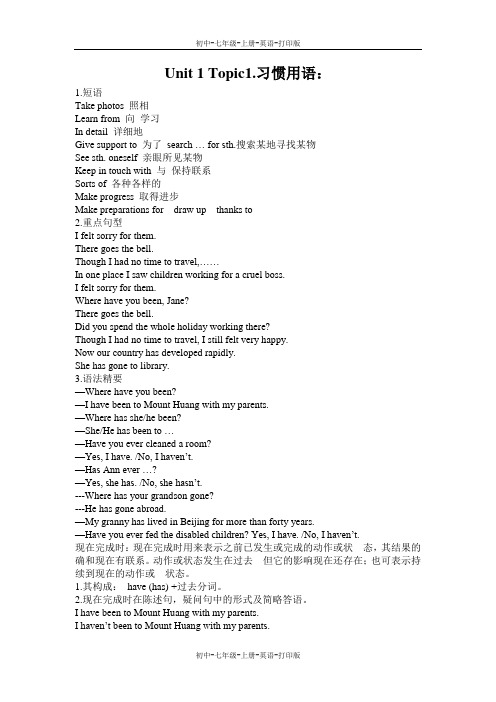
Unit 1 Topic1.习惯用语:1.短语Take photos 照相Learn from 向学习In detail 详细地Give support to 为了search … for sth.搜索某地寻找某物See sth. oneself 亲眼所见某物Keep in touch with 与保持联系Sorts of 各种各样的Make progress 取得进步Make preparations for draw up thanks to2.重点句型I felt sorry for them.There goes the bell.Though I had no time to travel,……In one place I saw children working for a cruel boss.I felt sorry for them.Where have you been, Jane?There goes the bell.Did you spend the whole holiday working there?Though I had no time to travel, I still felt very happy.Now our country has developed rapidly.She has gone to library.3.语法精要—Where have you been?—I have been to Mount Huang with my parents.—Where has she/he been?—She/He has been to …—Have you ever cleaned a room?—Yes, I have. /No, I haven’t.—Has Ann ever …?—Yes, she has. /No, she hasn’t.---Where has your grandson gone?---He has gone abroad.—My granny has lived in Beijing for more than forty years.—Have you ever fed the disabled children? Yes, I have. /No, I haven’t.现在完成时:现在完成时用来表示之前已发生或完成的动作或状态,其结果的确和现在有联系。
- 1、下载文档前请自行甄别文档内容的完整性,平台不提供额外的编辑、内容补充、找答案等附加服务。
- 2、"仅部分预览"的文档,不可在线预览部分如存在完整性等问题,可反馈申请退款(可完整预览的文档不适用该条件!)。
- 3、如文档侵犯您的权益,请联系客服反馈,我们会尽快为您处理(人工客服工作时间:9:00-18:30)。
九年级上Unit 1 Topic 1一、词汇短语1.after class2.come back from3.feel sorry for sb.4.have been (to )。
5. have taken part in /have helped / have spent /have done /have learnt6. in a disabled children’s home7. learn sth. from sb.Eg: We learn English from him every day .8.have no time to do sth.9.work -----for---10. the whole holiday11.see sb doing/ do sth12.take photos/ pictures13. an English traning school14. in a disabled children’s home15.feed the disabled children16.spend17.tell stories to the kids18.learn a lot/ alittle19.have a hard/happy /normal life20.in the past21.in the past year22.in the past few years23. discribe it in detail24.afford sth for sb25 have no chance to do sth26 have some trouble/ difficulty (in) doing sth27.at ptesent/ nowadays28. help support their families29.get a good education30. What’s more.31.search …for…32.learn sth about…33.give support to…34.with the help of…35.keep/have a balanced diet36.go abroad37. study abroad38. in the open air39.enter a competition40 win/ lose a competition41.write a lettered to do sth43 get/be used to doing sth44. be used to do sth45.one…., the other…46. some……, others…47.on the other hand48 on the other side of..49. at sunrise50. fall ill51 send …to…52. elder brother53 .be cruel for sb54.at that time/ moment55. feel/ be satisfied with…56. happen/ take place57 What happened to sb?58.dream of/ about…59.in the future6.in recent years61. in the past62.ring roads63.living conditions64.thanks to..65 .stand for…66.prepare for/ get ready for..67. welcome to….68. consider doing sth69. manage to do sth.70.Is that so ?71. consider …as…72. plant crops73. draw up…74.have gone to75. have been to..76. have been in….(for…)1.One World, One Dream 2.Thanks to the government’s efforts 3.the capital of---4.. the rich culture of china5.as well6.with the help of =with one’s help.7.divide my money into two parts.8. at that time/on that day9. --enough--- to do sth.10.made such rapid progress11. write an article about12.the Chinese teenagers’ lives二、重点句子1.Did you have a good summer holiday?2.How was your trip?3.In one place I saw children working for a cruel boss.4.I felt sorry for them.5.A: Where have you been, Jane?B: I have been to Mount Huang with my parents.6.A: Where has he/she / kangkang been?B: He has been to an English training school to improve his English.7.There goes the bell。
=The bell is ringing.8. A: Have you spent the whole holiday working there?B: Yes, I have. / No,I haven’tspend---on sth./ spend---(in)doing sth.9. A: Have you ever taken part in any activities during this summer holiday?B: Yes, I have. No,I haven’t.(否定回答)1.Could you please----?2.Parents couldn’t afford education for their children.3.Most children had no chance to go to school.4.Our country has developed rapidly. 。
5. A :By the way, where’s Jane?B: She has gone to the library.6.A: Has he / she ever…?B: Yes, he/she has. / No, he/she has never done that.7.A: When did he/she study abroad?B:He/She studied abroad a few years ago。
I used to be a child laborer2. Every morning, I got up at sunrise and went to the fields with the other children.3. Our job was to grow cotton.5. One part was used to help support my family, the other, to help send my elder brother to school.6. Life was cruel for us at that time.7. You should feel satisfied with your life now.8. Now, children’s lives are much better than before.9. My uncle has worked in Beijing for more than twenty years.10.China has developed rapidly in recent years.11. More and more ring roads have appeared12.People’s living conditions have improved a lot.13. China has made such rapid progress14.It is important to remember the past, live in the present and dream about the future.1.expresses the wishes of 1.3 billion Chinese people for a better world tomorrow.2.They express the rich culture of china as well.Topic 1单词表1.培训 2. 钟3.残疾的 4 整个的5中学习 6 弄整洁7.文章8.祖母9.描写10细节11详细地12.提供13 教育14 v.&n.供养15童工16 adv.当今17.(使)发展18.快地19n.娱乐20n.发展21 n.图片22 adv.什么时候23adv.到(在)国外24 adj.饿的25 v.分,划分26……分成……27 v. 使用28 adj.年长的29 adj.近来的30 adj.快的31 n.进步;进展32取得进步33 n.目前34 v&n梦,梦想35adj.狭窄的36.由于37n.首都38 n.口号,标语39 num.十亿40 n.便条41n.作文42v.考虑43起草44 n.纲要45 v.校对46 n.右边47n.例子48例如49 n.标题50 n.结论。
